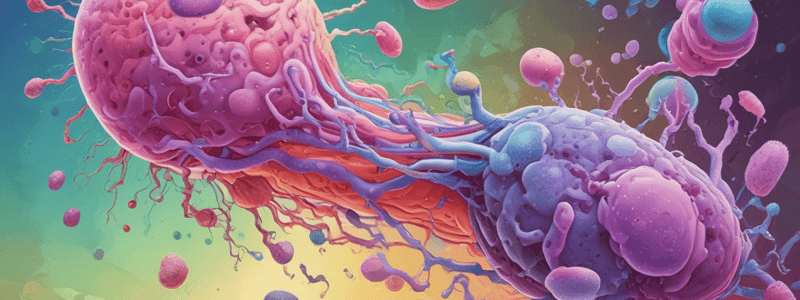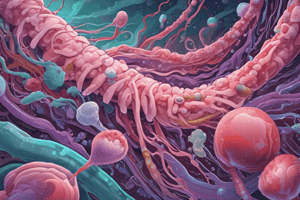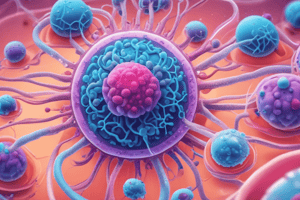Podcast
Questions and Answers
Which of the following is NOT a common complication of streptococcal infections?
Which of the following is NOT a common complication of streptococcal infections?
- Pneumonia
- Rheumatic fever
- Scarlet fever
- Chronic obstructive pulmonary disease (correct)
Which of the following causative agents is responsible for whooping cough?
Which of the following causative agents is responsible for whooping cough?
- Mycoplasma pneumoniae
- Bordetella pertussis (correct)
- Streptococcus pneumoniae
- Haemophilus influenzae
What is a primary symptom associated with a Legionnaire's disease infection?
What is a primary symptom associated with a Legionnaire's disease infection?
- Hemoptysis
- High fever and chills (correct)
- Severe headache
- Rash
Which upper respiratory infection is primarily associated with Streptococcus pneumoniae?
Which upper respiratory infection is primarily associated with Streptococcus pneumoniae?
What is a significant effect of rhinovirus infection on the human body?
What is a significant effect of rhinovirus infection on the human body?
Flashcards are hidden until you start studying
Study Notes
Streptococcal Infections
-
Streptococcal Pharyngitis (Strep Throat)
- Caused by Group A Streptococcus (S. pyogenes)
- Transmitted through respiratory droplets and direct contact
- Symptoms include sore throat, fever, swollen lymph nodes, and white patches on the tonsils
- Treated with antibiotics, typically penicillin or amoxicillin.
-
Scarlet Fever
- Caused by the same bacteria as strep throat when a toxin is produced
- Characterized by a red rash, high fever, and strawberry tongue
- Transmitted through infected individuals or contaminated objects
- Managed with antibiotics and supportive care.
-
Necrotizing Fasciitis
- Severe infection often caused by S. pyogenes
- Rapidly destroys tissue and can lead to systemic shock
- Transmission via skin breaks or after surgical procedures
- Requires aggressive treatment including surgery and intravenous antibiotics.
Complications of Streptococcal Infections
-
Rheumatic Fever
- Potentially arises after untreated streptococcal throat infection
- Affects heart, joints, skin, and nervous system
- Can cause long-term heart damage and requires anti-inflammatory medication.
-
Post-Streptococcal Glomerulonephritis
- Kidney inflammation following streptococcal infections
- Symptoms include hematuria and hypertension
- Usually resolves with minimal long-term effects but requires monitoring.
-
Toxic Shock Syndrome
- Rare but life-threatening condition linked to streptococcal infections
- Symptoms include fever, rash, and multi-organ dysfunction
- Treatment involves immediate antibiotics and supportive care.
Upper Respiratory Infections
-
Haemophilus Influenzae Infections
- Causes conditions like otitis media and sinusitis
- Symptoms include ear pain, fever, and nasal congestion
- Vaccination has reduced incidence; treated with antibiotics.
-
Streptococcus Pneumoniae Infections
- Leading cause of bacterial pneumonia and sinusitis
- Symptoms include cough, fever, chest pain, and difficulty breathing
- Comprehensive vaccination programs have decreased prevalence; treated with appropriate antibiotics.
Causative Agents, Transmission, Signs, and Symptoms
-
Whooping Cough
- Causative agent: Bordetella pertussis
- Transmission: airborne droplets from coughs or sneezes
- Symptoms: severe coughing fits, respiratory distress, and vomiting
- Treatment: antibiotics and supportive care.
-
Bacterial Pneumonia
- Causative agents: various bacteria including Streptococcus pneumoniae
- Transmission: respiratory droplets, aspiration, or blood
- Symptoms: cough, fever, chills, chest pain, and difficulty breathing
- Treatment: targeted antibiotics and sometimes hospitalization.
-
Tuberculosis
- Causative agent: Mycobacterium tuberculosis
- Transmission: airborne via inhalation of droplets from an infected person
- Symptoms: persistent cough, fever, night sweats, and weight loss
- Treatment: combination antibiotic therapy over an extended period.
-
Legionnaire's Disease
- Causative agent: Legionella pneumophila
- Transmission: inhalation of aerosolized water contaminated with bacteria
- Symptoms: high fever, cough, shortness of breath, muscle aches, and headaches
- Treatment: antibiotics effective against Legionella and supportive care.
Rhinovirus Infection Effects
- Causes the common cold, leading to symptoms such as runny nose, sore throat, coughing, and sneezing
- Increases mucus production and inflammation in the upper respiratory tract
- Can lead to secondary infections like sinusitis or otitis media in vulnerable populations.
Studying That Suits You
Use AI to generate personalized quizzes and flashcards to suit your learning preferences.



